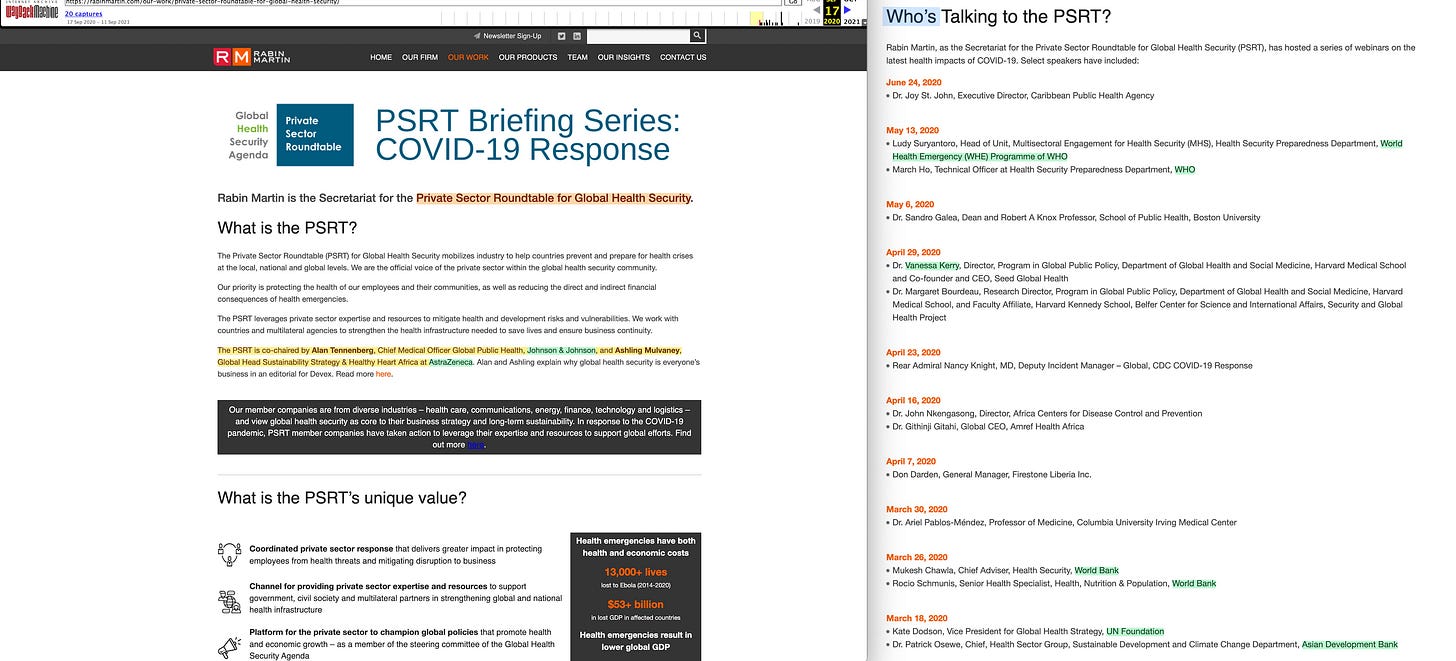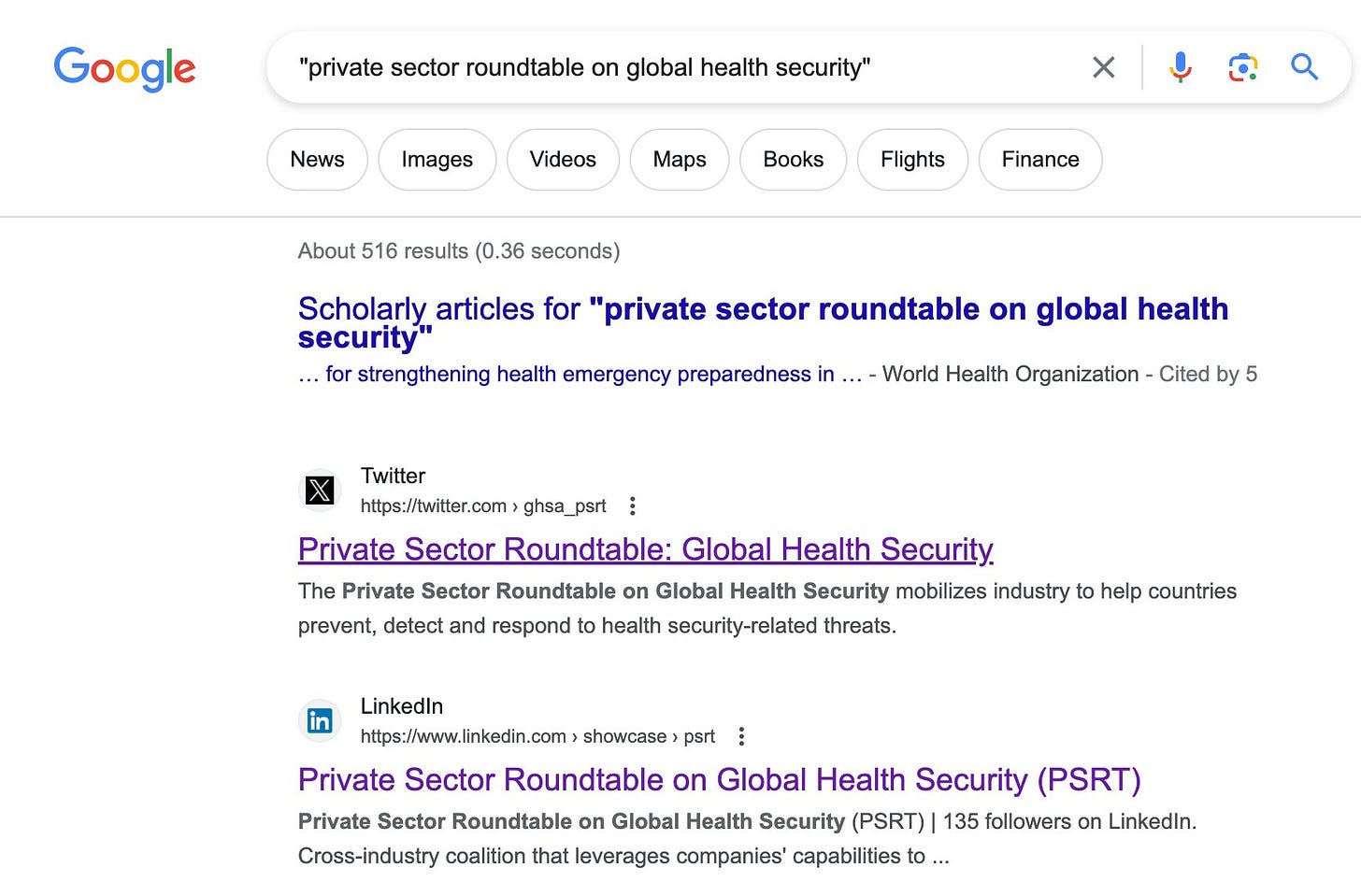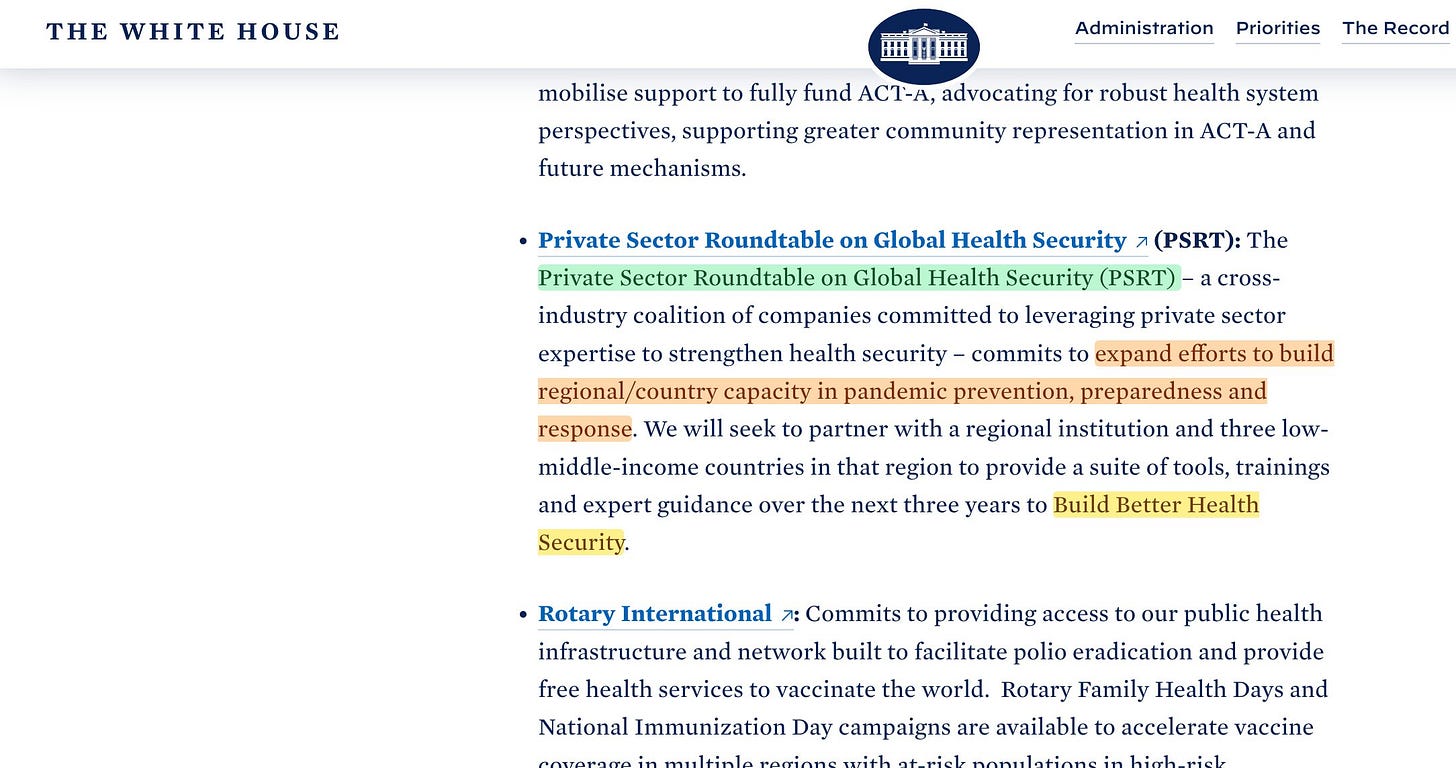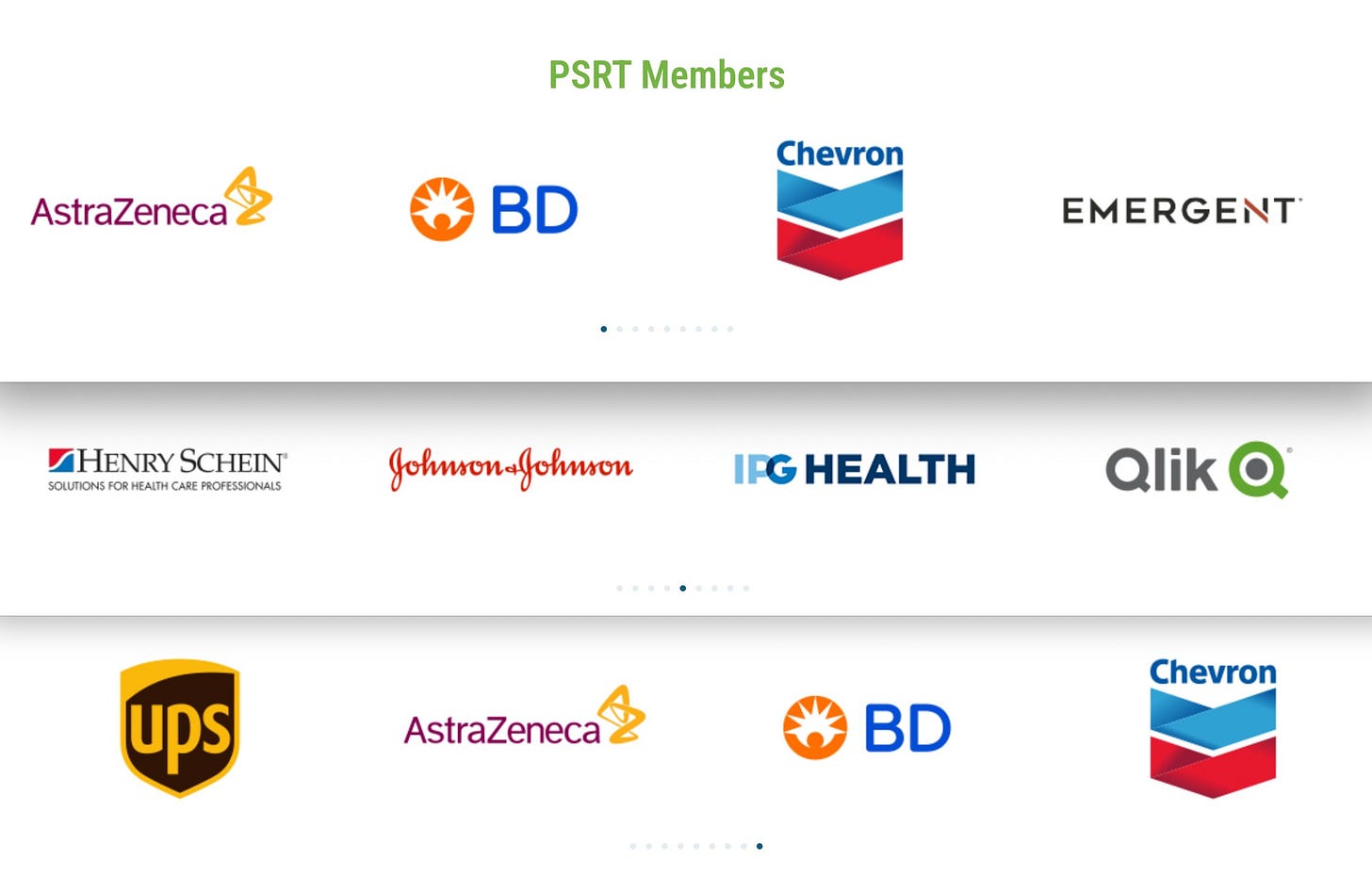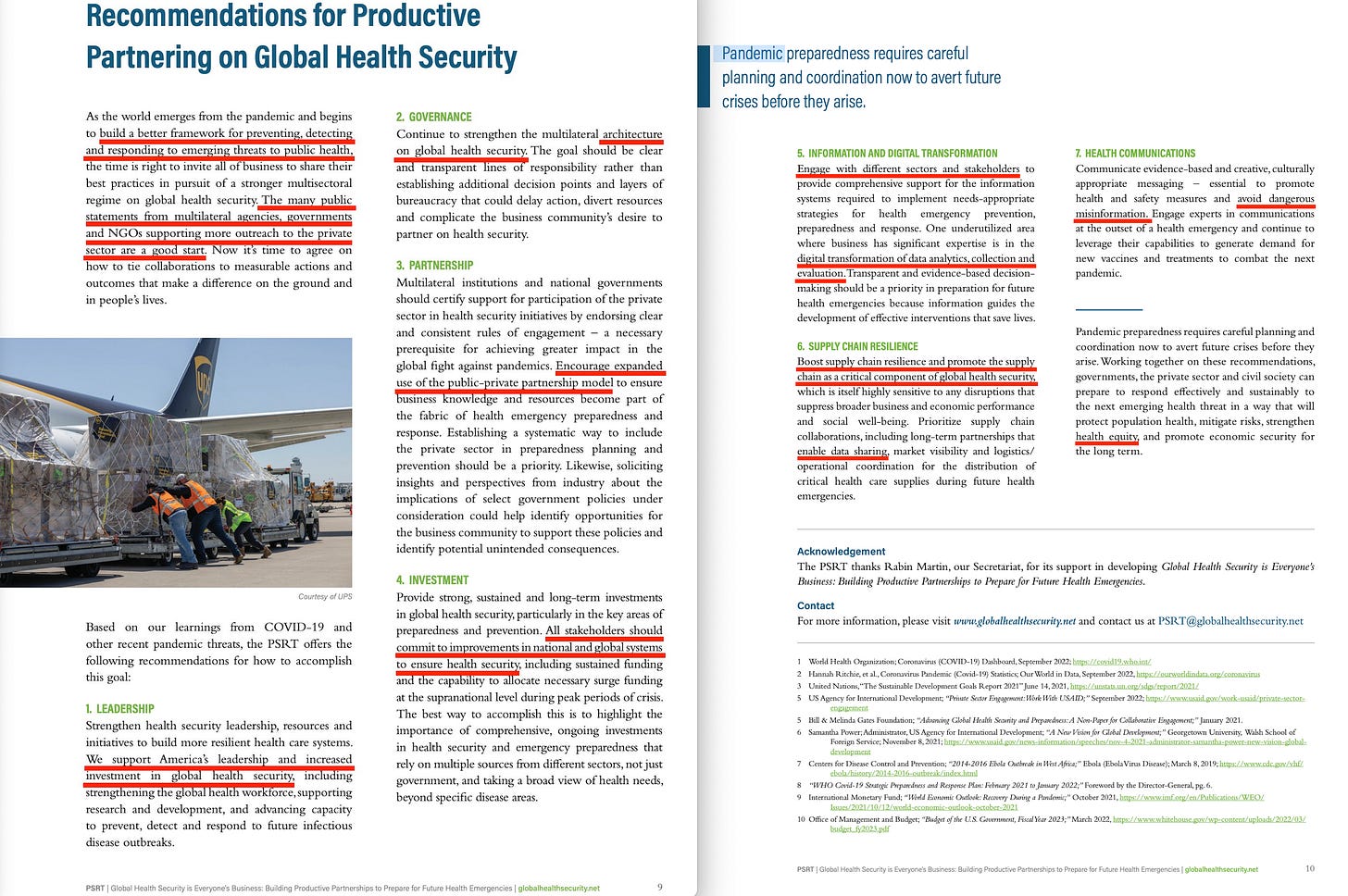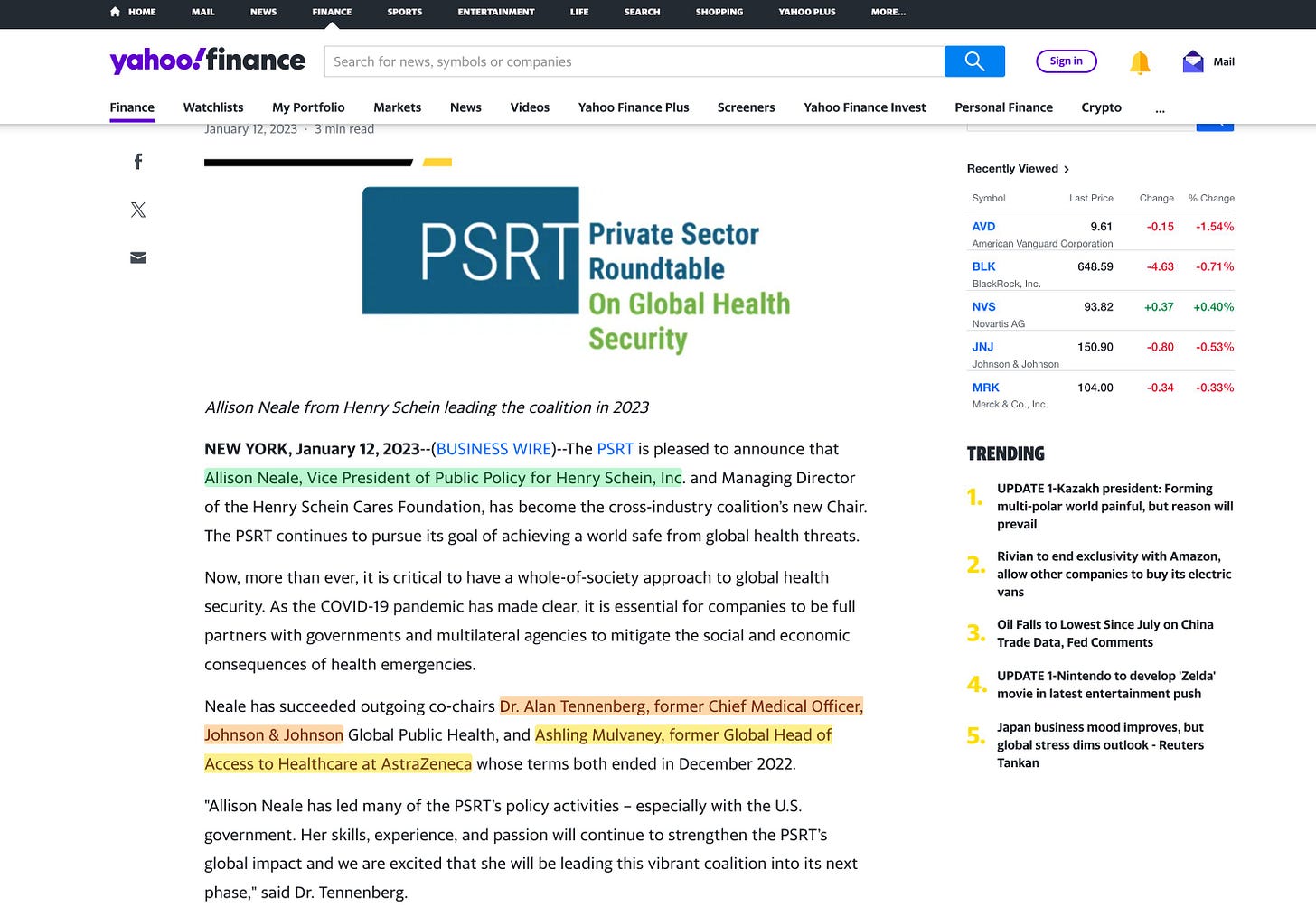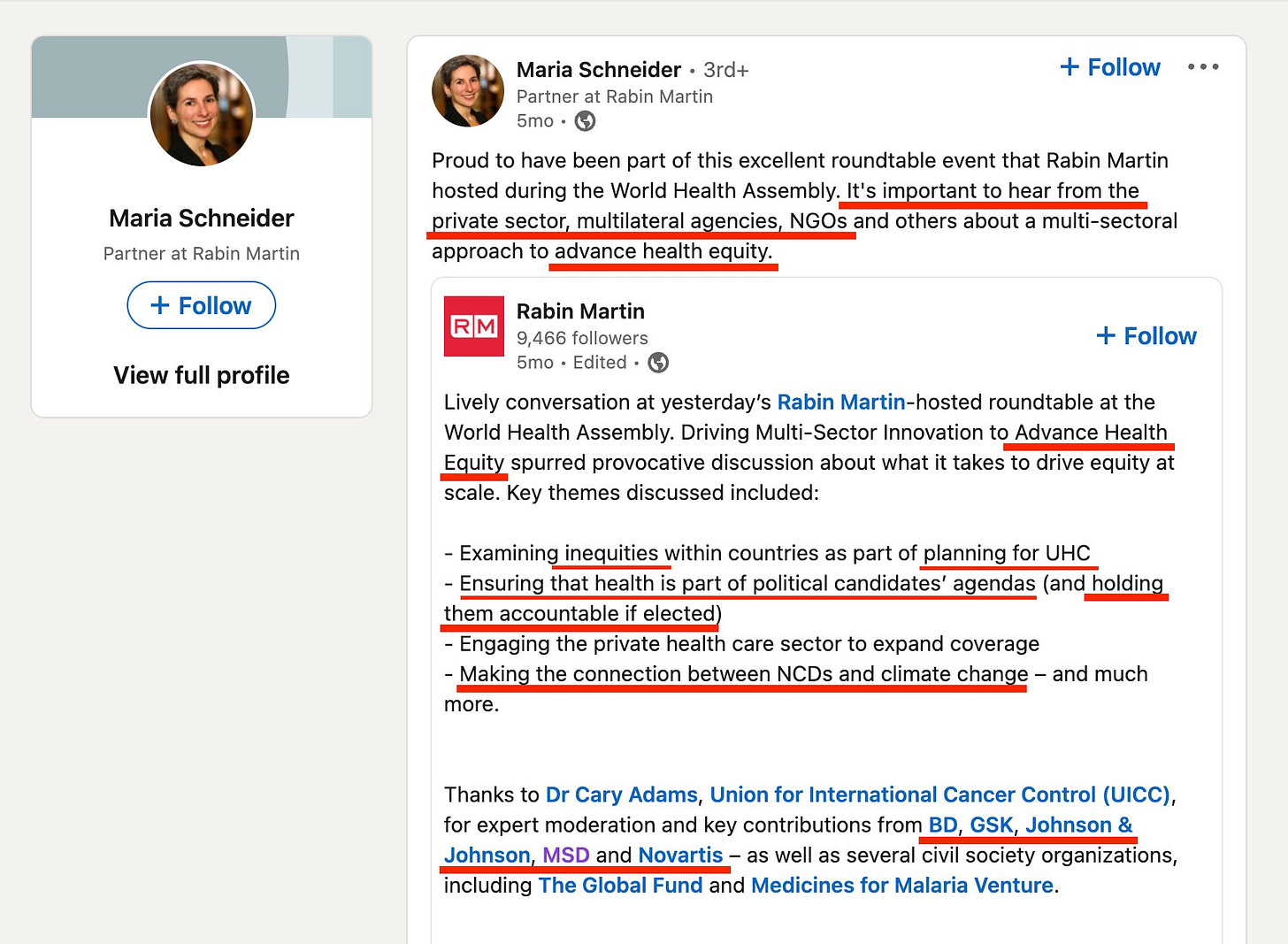The PSRT
Private Sector Roundtable for Global Health Security
Unless you’ve lived under a rock, you should by now have heard of the Private Sector Roundtable for Global Health Security, because these guys get invites to events that matter. The trouble is -
I rather suspect most of us have lived under said rock.
Describing themselves thusly - ‘We are the official voice of the private sector within the global health security community‘, you would expect the name to be ubiquitous. Thing is, it’s kind of hard to dig up information on this lot. I’ve done this for a while, and there is very little information in this regard.
516 results on google. That’s it. Far less, when you actually browse through them.
They do have a Twitter presence over here, but in spite of obvious influence, they have in nearly 7 years of operation only managed to gathered 588 followers.
And I really wasn’t kidding about the invites. Here’s a link to an official Department of State page.
… aaand here’s their specific commitment. Hosted with the official seal of the White House, and all.
And they are in good company. Abbot, BlackRock, Gates Foundation, MedAccess, Rockefeller, Merck, Pfizer, NTI, Open Society, and Seed Global Health are casually mixed in with the likes of Germany, Palau, and Norway. Also added the Task Force because they haven’t yet received their due attention.
Corporations and governments, sitting in a tree. F-A-S-C-I-S-M.
One of the few search results via google is on the Rabin Martin website. I quote -
‘A white paper published in September by the Private Sector Roundtable on Global Health Security, a cross-industry business coalition, makes a strong case for the business community’s indispensable role as a full partner in developing prevention and preparedness strategies for complex health threats‘
There’s just one teeny little thing about this, however…
… yes, see, there’s a reason why I didn’t link the website until now. And here it is. Scroll down the very bottom, and you’ll find that - and I quote - ‘Rabin Martin is the Secretariat for the Private Sector Roundtable‘
The post on RM’s website is an act of self-promotion.
What you will also find on their page is a - I suspect - incomplete list of PSRT members, which features the usual assortment of altruistic corporations, like AstraZeneca, Johnson & Johnson, Becton Dickinson... yes, all those companies who made a mint out of locking down your kids because of an illness which is more or less harmless to anyone under 60 in otherwise good health, per Ioannidis.
Either way, let’s have a look at that report. And, blasting out the gate — we’re off to a very strong start. See these chaps want to strengthen health systems around the world. Whether you wish for them to be strengthened or not doesn’t factor into the equation. Rabin Martin does, and that’s all that matters. Oh, did I say Rabin Martin? Apologies. I of course meant the Private Sector Roundtable. I think my confusion is caused by both organisations being present on the front page of the report.
What I also find of interest is that they’re allegedly on the steering committee of the Global Health Security Agenda. Yes, the one about One Health. And they issue a call to action, which is quite possible the most telling aspect of the report, because it’s directed at the private sector, governments, and ‘communities’ to build strong, resilient health systems.
Now, I happen to know for a fact that no common garden prole was ever consulted on this issue, consequently, I think it’s pretty safe to say that by ‘communities’, they mean NGOs and Foundations.
No, not you, smelly prole.
The document was built upon a whitepaper released in September, 2022, which broadly carries the same content. But there are parts, which were airbrushed in version 2.0. The public version.
And how do I know that? Simple. Because most by now know not to blatantly advertise for the Gates Foundation, who I now suspect also funds this enterprise.
Now, I have an unfinished article… well, actually I have around 25 if I recall correctly, but that’s besides the point. The related article is on HR391, which was merged into the passed NDAA 2023 defense bill. In short, it outlines the creation of a pandemic fund, to be used for construction of infrastructure in primarily the third world. I’m still suspecting it’s the fund outlines in the recent Pandemic Treaty, but I haven’t yet found the evidence.
The fund exists to ensure the surveillance is global. That’s what it’s for.
But the article also outlines their indirect cooperation with the World Economic Forum, through the Pandemic Supply Chain Network initiative, which launched in 2014 following alleged Ebola. I say alleged, because 2009, 1997 and 1976 were all about as genuine as Pamela Anderson’s… and don’t get me started on 2020, or even 1968, either.
And finally, but not least, the worst of the lot. Their recommendations. The intro goes like this, so you know it’ll be good -
‘The many public statements from multilateral agencies, governments and NGOs supporting more outreach to the private sector are a good start‘
Funny. That wasn’t really the conclusion I arrived at. Anyway, their recommendations -
‘We support America’s leadership and increased investment in global health security…‘
‘… architecture on global health security…’
’Encourage expanded use of the public-private partnership model…’
’All stakeholders should commit to improvements in national and global systems to ensure health security, including sustained funding and the capability to allocate necessary surge funding at the supranational level during peak periods of crisis…’
‘… digital transformation of data analytics, collection and evaluation…‘
‘Boost supply chain resilience and promote the supply chain as a critical component of global health security…‘
‘… and avoid dangerous misinformation‘
You can crack as many jokes as you wish. This is the explicit fusing of corporate interests into governments. Your vote will not matter one iota. This is fascism.
And it’s even going as far as them pushing their own content through subversive sponsored content infomercials.
And who is Alan Tennenberg, and Ashling Mulvaney?
The latter question is answered by this Yahoo! Finance! Article! Posted! At! The! Beginning! Of! The! Year!
See, Tennenberg (former Chief Medical Officer, Johnson & Johnson), and Mulvaney (former Global Head of Access to Healthcare at AstraZeneca) were in January, 2023, replaced with Allison Neale (Vice President of Public Policy, Henry Schein, Inc)
And the Henry Schein link itself, is more or less indicative of what is wrong with the world at present. Because in this May, 2023 annual meeting notice, the actually include this relationship under an ESG virtue.
Robbing people blind of their democratic rights for alleged sakes of strengthening health system - for which no-one outside the ‘stakeholders’ asked - unbelievably counts positive in their book, when it comes to matters of Environment, Social, and Governance.
What does that tell you about ESG values?
Not to be outdone, Johnson & Johnson also take the misguided opportunity to parade about their stakeholder virtues. Health for Humanity 2020. I mean, the utter shamelessness on display here.
So let’s have a look at a few people. Allison Cohen Neale, for starters.
‘Engage in select strategic public policy initiatives and partnerships to further Henry Schein’s initiatives and objectives…‘
You know, not long ago, this type of work was known under a different word.
Corruption.
Let’s drag in the authors of the sponsored article above. Emma Dahill. Project CURE and the Vennue Foundation are both vaccine pushers. But she’s clearly junior here.
We also have Kevin Lass, who used to work for the Canadian government. Before he decided to jump ship, and push fascism. Tellingly, he included this as part of his RM description -
‘…creating unique ways for more people to access our client's therapeutics, …‘
Really? Is RM yet another subversive big pharma operation?
And finally, the final author, Maria Schneider, with an extensive record in philanthropic endeavours, corporate social responsibility, health equity, public/private partnerships… and global health security.
I tell you what, in my book, the latter is practically mutually exclusive with those other qualifications. She sounds expressly like someone who only really notice the common garden prole, when she steps on them.
Not that I think it’s important (because it’s been so long), but she also used to work for the Pfizer Foundation.
And, now, in the context of LinkedIn, let’s have a brief look at a few posts. Apparently, they were present at the UNGA78. I personally didn’t notice. I couldn’t hear them over the noise of global governance. And their focus; gender issues, and some more explicit sexism intended to create an ideological blind spot.
But that was really just the warm-up act. Here’s the real deal.
Here is Maria Schneider, wanting to hear from ‘the private sector, multilateral agencies, NGOs‘… but not the smelly prole.
No, she wants to ‘Ensuring that health is part of political candidates' agendas (and holding them accountable if elected‘.
How exactly will you hold them ‘responsible’, Maria? And how will you ‘ensure that health is part of his or her agenda’?
To me, this sounds - quite a lot - like you are attempting to corrupt the political process. And no, I couldn’t care less if this is legal. It’s wrong.
But thank you for ‘key contributions from BD, GSK, Johnson & Johnson, MSD and Novartis…‘
No, not you, smelly prole. This is about them, and your ‘representatives’.
I hinted at Gates involvement. And prepare to act all surprised. Event 201.
And as for the other suggestive involvement, here’s an article on Rabin Martin, which was acquired in 2016.
They, indeed, are about ‘creating solutions that address public healthcare challenges’. Ie, sell gear. Like vaccines.
And to wrap up, I’m going to repeat the question I asked of Tedros only yesterday, when originally posting this on Twitter. Because the WHO published a report in 2021 on the topic of ‘Advancing Health Emergency Preparedness in Cities and Urban Settings in COVID-19 and Beyond‘ - here’s the link.
Why was Ashling Mulvaney invited to participate in working groups, when no-one had even heard of the existence of the Private Sector Roundtable?
With only 500 results in late 2023, I can only assume the number to be much lower in 2021 - before they released their whitepaper and report. A ‘custom range’ search with results before 2022 yields only 8 results, but I don’t expect that to be accurate.
So why were they invited? How did you come to hear of them?
And how does it in any way reflect ‘democratic ideals’, inviting opaque organisations without any level of democratic oversight or participation?
I doubt Tedros will bother to reply. After all, I am nothing but a mere, common garden prole to his ilk. So I’m going to suggestively reply to my own question, using a capture taken from the report linked above.
Because those private sector stakeholders need representation, too.
Anything else would be undemocratic.


